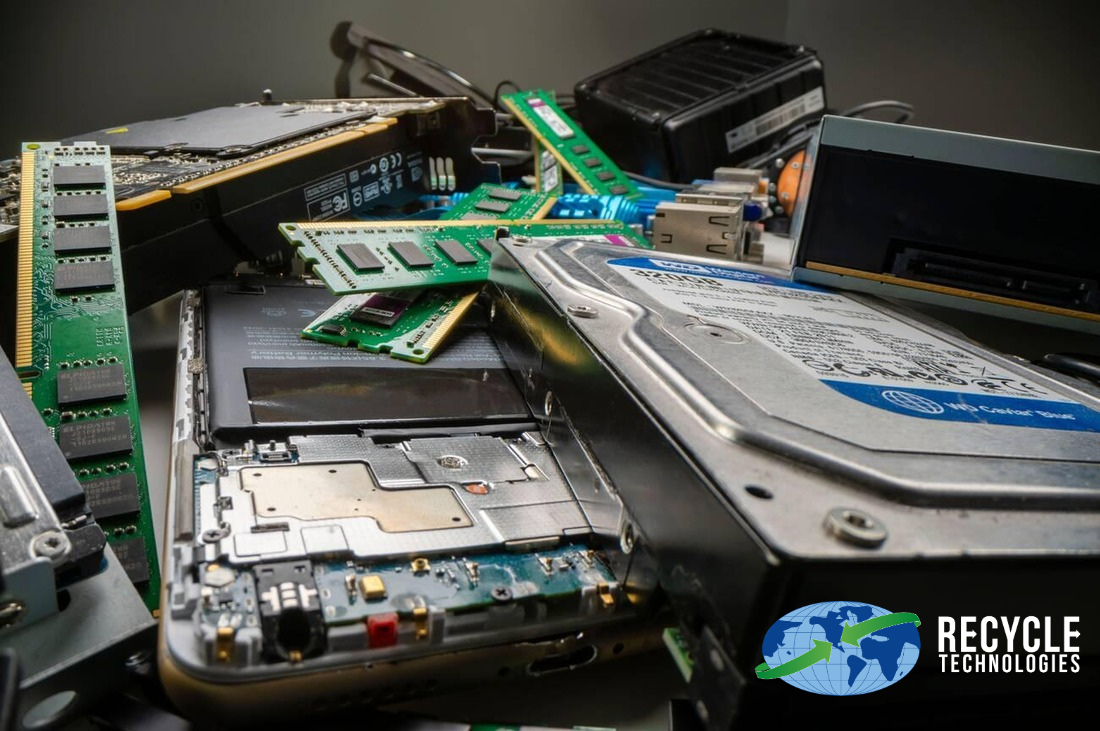Electronic recycling received attention in the USA with the increase of e-waste in 1976. The EPA (Environmental Protection Agency) passed the RCRA for resource conservation and recovery. This act executed several other e-waste management programs opening the door for electronics recycling. Further, recycling laws were made to protect the environment from illegal dumping of hazardous e-waste. It increased the need to pass an international treaty in 1992, the Basel Convention. It led to the rise of electronic recycling facilities to reduce the impact of e-waste in Europe and the USA.
Electronic waste recycling facilities take the lead in minimizing the load of unwanted, broken, and outdated electronics. Recycle Technologies is amongst them to handle your complex hazardous waste stream. The recycling of e-waste prevents toxic emissions into the air, water, and soil. An effective way to extend product life, reduce energy consumption, and create economic opportunities.
In this blog, we will learn the steps taken for e-waste management and the potential outcomes associated with electronic waste recycling knowing the need to adopt smart electronic waste management.
Role of EPA
E-waste management follows three steps; reuse, refurbish, and recycle. The Environmental Protection Agency works with government officials around the world to manage E-scrap. The Taiwan-EPA and US-EPA have initiated the International E-waste Management Network (IEMN) for providing an exclusive partnership with global environmental officials to devise the best possible practices on E-waste Management since 2011.
StEP Initiative
StEP in coordination with UNU, has decided to focus on its activities and projects on five life cycle areas-design, production, usage, reuse, and recycling till the final disposal of electronic waste. They are working hard to find ways to reduce the consumption of electronic products, to extract resources from E-waste, and to produce environmentally friendly E-waste recycling protocols
Potential Positive Outcomes of Electronic Recycling For The Masses:
The benefits are several to buy eco-friendly products at reasonable costs with job opportunities. Following are a few to mention below;
Data Security:
Data security is the primary concern of cyber security. It is customers need to use safe hardware destruction methods. Both in terms of environmental protection and data security to eliminate the risk of data breach or unauthorized access to sensitive information.
Growing Demand For ECO-Friendly Products:
The refurbished products are in demand. It shows the increased demand for eco-friendly products. It is a cost-effective solution to buy refurbished or recycled electronic products at reasonable prices. This also reflects the success of designing environmentally friendly strategies to adopt a sustainable approach.
Economic Incentives And Opportunities:
E-waste recycling brings economic incentives and employment opportunities. The extraction of precious metals makes recycling economically viable. Many participate to conserve energy and heavy metal resources. The heavy metals are Gold, Silver, Palladium, Cobalt, etc. It creates new jobs for handling recycling technologies operations and labor required for the entire e-waste management. Companies are encouraged for incentives in Recyling e-waste.
According to Business Fortune insights, the global market size of E-waste management in 2021 was 49.29 million tons. It is projected to grow by 63.22 million tons by 2029. According to an estimation by EEW-Outlook 2050 roughly, 225000 full-time jobs would be created for only pre-treatment, collection, and repair of used EEE by 2050. According to the Circular Economic Report, the annual worth of E-waste is $62.5 Billion.
In compliance with rules and regulations:
Every country is struggling to design and implement a framework for safe disposal of hazardous waste. It further promotes and expands e-waste recycling centers to gain profit. The rules and regulations are adopted by recycling facilities to get rid of bulky electronic waste.
Reduce the greenhouse gas emissions:
Recycling E-waste will reduce the emissions of greenhouse gas. It has a significant contribution to global warming. The temperature rise is making the environmental conditions unfavorable for living. The 2050 EEE waste outlook forecasts a substantial portion of hazardous greenhouse gas will be managed to mitigate emissions of up to 60 t of cadmium, 6 t of mercury, and 53 Mt Co2 equivalent.
Challenges:
Informal Electronic Recycling Disposal Practices:
Informal e-waste recycling practices cause environmental pollution and toxic effects on health. It makes the air toxic and water impure. Incineration and open burning are practices lethal to the environment. The laborers working under these conditions suffer from exposure to hazardous heavy metals and toxic chemicals.
Research And Development:
Research and development in electronic recycling is essential. Technology keeps on evolving with time. The composition of waste changes with new IT technologies. Likewise, recycling technology also needs modification to recycle all components of electronic waste.
Why choose RTI for electronic recycling?
RTI is one of the most well-organized electronic recycling facilities in Wisconsin. We strive to gain maximum benefits from a circular economy. Our work follows EPA rules and regulations for electronic waste recycling. We give valuable solutions to deal with the current complex hazardous e-waste stream. Our success relies on a pledge of zero waste emissions and safe hardware destruction to build customers' trust. We struggle to minimize the impact of electronic waste on health, and the environment.
Visit our website; We offer electronic waste recycling services securing the environment.












